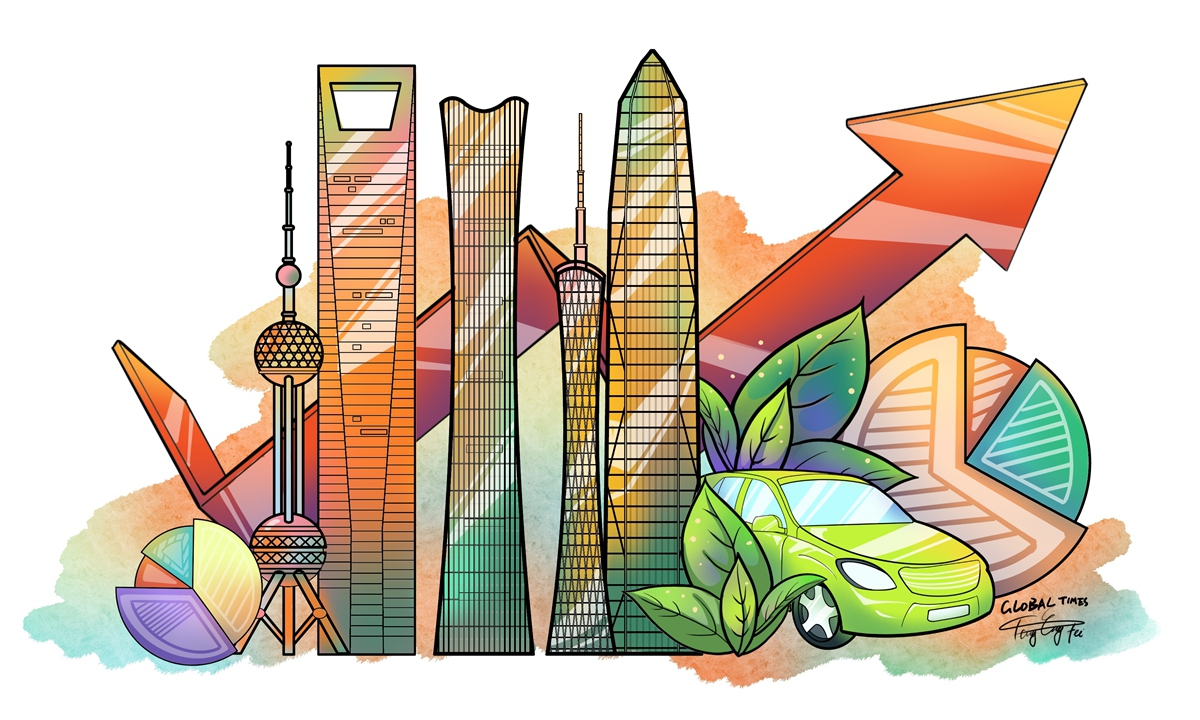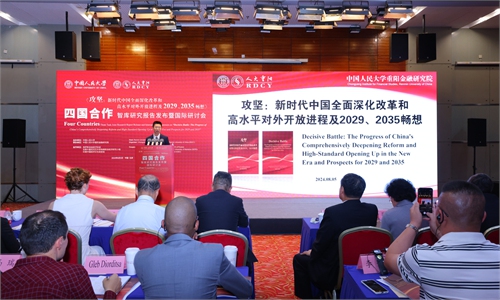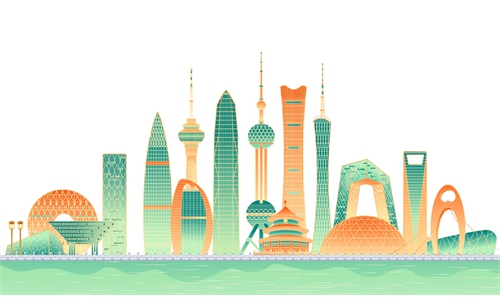
Illustration: Tang Tengfei/GT
During recent years, a slew of media outlets, think tanks and commentators in the West have directed intense focus and attention to the state of China's economy. Countless articles adorned with dramatic headlines have asserted the inevitability of the country's economic decline and heralded its impending demise.Setting aside the alarmism and fear-mongering rhetoric, however, a sober, more balanced appraisal of China's broader economic realities suggests that the prevailing pessimism and bleak narrative proclaiming China's economic downturn is largely a misunderstanding and lacks critical nuance.
First, as with so many things, context is enlightening. Since China began to open up and reform its economy just over four decades ago, it has undergone an unparalleled transformation. Alongside its implementation of economic reforms and opening up, which were major drivers for growth via foreign and private sector investment and trade, factors such as industrialization, urbanization, demographics and globalization helped China achieve one of the most impressive growth miracles in modern history.
Against this wider backdrop, the fact that China's GDP growth rates have now tapered off from their previously blazing hot levels should hardly be surprising. Such a cooldown is natural for a maturing and what is now a substantially larger overall economy.
More broadly, instead of being on the brink of a great collapse amid an irreversible economic free fall, China is actually now transitioning to a new stage of "high quality" economic growth and development. Today, China is the global champion in research and innovation in dozens of critical technologies, while also being distinguished as the world leader in green energy and the new "big three": electric vehicles, lithium batteries and photovoltaics.
A second crucial point is that China has long demonstrated strong, far-sighted vision and considerable resiliency, as well as retained an openness to adapt and change its policies and approaches. The country continues to enact a raft of measures and policy reforms to further open its economy, bolster long-term confidence and stimulate growth. More than 300 significant reform measures were introduced, with the expectation that they will be fully implemented within five years. This will not only provide a robust foundation for the Chinese economy and inject a strong impetus for growth, but also result in more opportunities for global development.
China's history of resilience and its characteristic adaptability equip it to swiftly and effectively respond to volatility, counteract pressures and meet new challenges, be they domestic or external, and successfully navigate its ongoing economic transition amid a complex, turbulent global landscape.
A particularly important dimension to China's economic story, albeit one that is often overlooked, is the immense potential of its vast domestic market. Specifically, the country has a large population and a burgeoning middle class that is expected to swell to about 800 million over the next decade, all of which is expected to spur economic growth and expansion through consumption.
Speaking at the World Economic Forum, which convened earlier this year in Davos, Australia's ambassador to the US, Kevin Rudd, highlighted this exact point, "Remember, the scale of the Chinese consumer market is unprecedented in global economic history. I don't accept 'peak China' at all. I think it's intellectually and analytically flawed because of the untapped potential of Chinese consumer demand," he said.
After producing one of the most impressive economic growth miracles in history, China is now transitioning to a new stage of "high quality" growth and development. While it is undeniable that it is confronted by a number of challenges and pressures, including an aging population, real estate issues, the lingering effects of the COVID-19 and slower growth compared to past decades, these are not insurmountable and do not spell an impending collapse.
The rhetoric surrounding China's economy is overblown, ignores critical context and complexity, and is heavily fueled by geopolitical agendas. A more nuanced, balanced view recognizes that while China faces significant issues, it remains dynamic and has an array of considerable strengths, still boasts immense untapped potential, and will continue to be a formidable economic presence on the evolving global stage.
The author is a scholar and analyst focused on political economy, development, and human rights. His forthcoming book, Dragon and Camel: An Critical Examination of Multifaceted Cooperation and Engagement Between China and Eritrea, explores the history of China-Eritrea ties. opinion@globaltimes.com.cn



